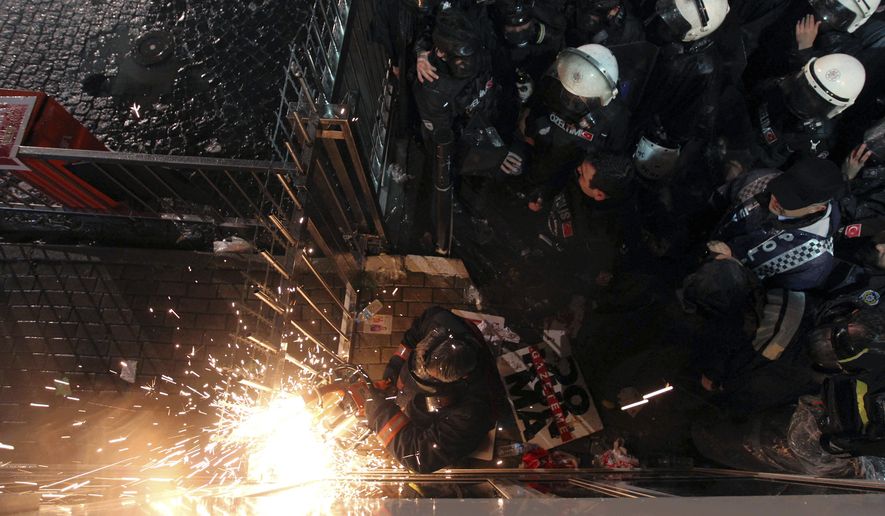ANKARA, Turkey (AP) — The European Union is facing increasing pressure to speak out against the erosion of media freedom in Turkey following the forced take-over of the country’s largest-circulation newspaper, but few expect it to take a bold stance toward Ankara while trying to assure its help in dealing with the migration crisis.
Police used tear gas and water cannons late Friday to storm the headquarters of the Zaman newspaper and enforce the court-ordered seizure of the publication, which is linked to President Recep Tayyip Erdogan’s top foe, U.S.-based opposition cleric Fethullah Gulen.
On Saturday, hundreds of the paper’s supporters staged a second-day of protests outside the building, now surrounded by police fences. They chanted “free press cannot be silenced” and “Zaman cannot be silenced” as riot police used shields and tear gas to push the crowd, sending protesters running into side streets for protection. Some were seen rubbing their faces with pieces of lemon to mitigate the effect of the tear gas, the private Dogan news agency reported. A number of protesters were hurt, the agency added.
The Istanbul court’s appointment of trustees to manage Zaman and its sister outlets further reduced the number of opposition media organizations in Turkey, which is dominated by pro-government news outlets and where censorship is rife. It raised alarm bells over the deterioration of rights conditions in the NATO member nation, which also aspires for EU membership, just days before a March 7 meeting, in which EU leaders will try to convince Turkey to do more to curtail the flow of migrants traveling to Europe.
“The EU countries are preoccupied with their migration crisis, they are no longer concerned by rights violations in Turkey,” said Semih Idiz, columnist for the opposition Cumhuriyet and independent Daily Hurriyet newspapers. “They’ll say a few things as a matter of form, but they know they are dependent on Turkey.”
The Saturday edition of English-language Today’s Zaman, published before the forced take-over, printed its entire front page in black with the headline: “Shameful day for free press in Turkey.”
Zaman’s seizure, which sparked outrage from international rights advocacy groups, was part of an intensified crackdown on Gulen’s movement, which the government claims is attempting to topple it. Authorities accuse the movement’s followers of infiltrating police and the judiciary and of orchestrating corruption allegations in 2013 that implicated Erdogan’s inner circle.
Gulen, who has lived in self-imposed exile in the United States since 1999, was once Erdogan’s ally. Over the past years, the government has purged civil servants allegedly linked to the movement and seized businesses affiliated to it. The movement has also been branded a terror organization although it is not known to have carried out any acts of violence.
Rights advocacy groups accuse EU nations of keeping mute about deteriorating freedoms and human rights abuses in Turkey — including the large civilian death toll during military operations against Kurdish militants — because of the country’s crucial role in curtailing the flow of migrants to Europe.
During a visit to Turkey this week European Council President Donald Tusk spoke of the “good and growing cooperation” between Turkey and the EU.
“The European Union and the United States, as Turkey’s partners and allies, should not trade Turkey’s support on migration and Syria for silence over the dismantling of democratic institutions,” said Daniel Calingaert, executive vice president of the U.S.-based watchdog, Freedom House, following Zaman’s take-over.
The European Federation of Journalists said: “The European Union cannot remain silent to the political seizure of Zaman newspaper, Today’s Zaman daily and Cihan news agency.”
• Carl Amari can be reached at 11111@example.com.




Please read our comment policy before commenting.